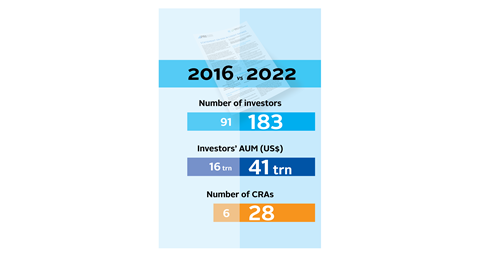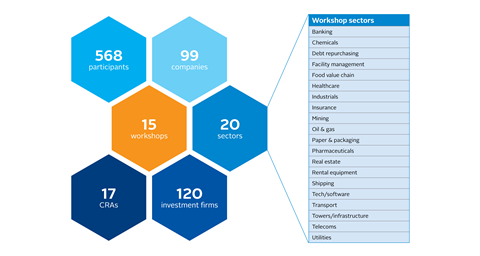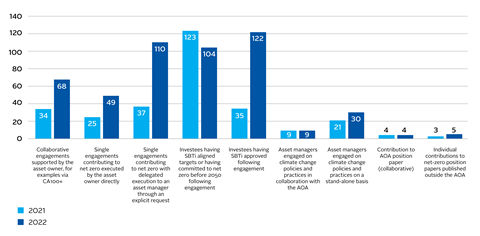
Message from Tamsin Ballard, Chief Initiatives Officer
Collaboration, consistent with investors’ duties and mandates, within and across financial and real economy sectors, creates opportunities for peer learning and enables greater coherence and transparency in the approaches and methodologies used. It also provides key stakeholders with the proof of concept and viability for actions that are needed – from policy makers through to the wider investment community.
By bringing all the investor initiatives together in a new team, the PRI is well placed to bridge connections across individual stewardship and sustainability initiatives and identify synergies.
New initiatives to meet growing demand
We have seen growing signatory demand for opportunities to collaborate and to participate in investor initiatives, and are scaling up our collaborative engagement offering to signatories. There is an ongoing value in investors working together to drive action at scale and at speed, and helping to set norms that can be built on by others.
By bringing all the investor initiatives together in a new team, we are well placed to bridge connections across individual sustainability initiatives and identify synergies.
In December 2022 we launched a new collaborative stewardship initiative, Advance, with the aim of supporting investors wanting to advance human rights and positive outcomes for people through investor stewardship, in line with their fiduciary responsibilities. We also launched a pilot initiative, testing collaborative sovereign engagement on climate change, with an initial focus on Australia.
Planning is underway for a new collaborative stewardship initiative to help facilitate investor efforts to understand and address nature loss – which threatens half the world’s GDP.
Supporting climate action and net zero commitments
Our longest-running collaborative engagement, Climate Action 100+ (CA100+), has launched its second phase to inspire greater corporate climate action in this critical decade. The new phase, running until 2030, intends to inspire a global scale-up in active ownership, markedly shifting the focus from corporate climate-related disclosure to the implementation of climate transition plans.
PRI works closely with investors, financial service providers, the UN and investor networks on four net zero initiatives. We have seen real progress through the year from some of the biggest net zero alliances, with an increase in the number of interim targets and the AUM included across the UN-Convened Net Zero Asset Owner Alliance (NZAOA) and the Net Zero Asset Managers Initiative (NZAM).
We have focused on supporting members of the net zero initiatives to deliver on their commitments, including by engaging with external partners and stakeholders to help build a supportive enabling environment for members to deliver. This includes through the co-creation of tools, for example through the Assessing Sovereign Climate-related Opportunities and Risks (ASCOR) Project, which provides investors with a common understanding of sovereign exposure to climate risk and of how governments plan to transition to a low-carbon economy. Looking ahead, we will be engaging with the UNFCCC as it sets a new Recognition and Accountability Framework that builds on the important work and norms established by the net zero alliances.
An ever-stronger case for collaborative action
Despite politically motivated attempts to curtail investor engagement with ESG issues in some jurisdictions, the case for collaborative engagement, such as the kind conducted through initiatives like NZAM, NZAOA and CA100+, is clear. Investors should of course ensure they abide by all relevant laws and regulations while engaging in such work, but the benefits of establishing best practice through a community of peers is undeniable. Indeed, the UN Secretary General has publicly highlighted the importance of collective climate action, affirming that it “does not violate anti-trust – it upholds the public trust”.
Shared action lays the groundwork needed to lead to positive outcomes for investors and their beneficiaries, allowing them to optimise their approach to disclosure and risk management, and ultimately deliver better outcomes. These benefits are understood and welcomed by our initiative signatories, as evidenced by the continued and ongoing support for our work in this regard.
Collaborative engagements
Climate action 100+
Ensuring the world’s largest corporate greenhouse gas emitters take necessary action on climate change
This year marked the final year of phase one for Climate Action 100+ – the world’s largest investor-led initiative on climate change. More than 85 additional investors joined this year, demonstrating accelerating appetite and bolstering engagements.
The PRI is one of five investor groups coordinating Climate Action 100+, alongside AIGCC, Ceres, IGCC and IIGCC. Launched in 2017 as a five-year initiative, it is now moving into its second phase, shifting the focus from climate disclosure to implementing transition plans.
Investors have reported promising improvements in responsiveness and constructive participation from focus companies, including more ambition from companies on:
- reduction targets, including on scope 3 emissions, aligning with a 1.5o C scenario or reaching net zero sooner;
- reporting, such as through climate transition plans, climate policy engagement disclosure and TCFD reports;
- tangible action, such as investment in decarbonisation projects/technology, retiring coal plants, leading sector-specific partnerships groups, supporting climate-related shareholder proposals and making climate-focused board appointments.


An enhanced version of the initiative’s benchmark – which investors use to measure companies’ progress against the initiative’s three high-level goals – increases focus on emissions reductions, alignment with Paris Agreement goals and net-zero transition plans’ robustness. An updated guide for engaging in Asia sets out how the benchmark applies to Asian and emerging market companies.
The initiative has also continued to flag key climate-related shareholder proposals and other votes for investors to consider during proxy season. A series of explanatory articles looking at key themes from the 2023 AGM season include discussions of climate accounting, just transition and Board accountability for climate action.[1]
Read the 2022 progress report.
2023 and beyond
This year also saw significant consultation with signatories on the initiative’s next phase. Running from 2023-2030, this phase will feature updates to the three core goals, improved and expanded ways for investors to participate, an enhanced engagement model and an updated company list.
Advance
Using collective influence to drive positive outcomes for workers, communities and society
Launched in 2022, Advance is the PRI’s flagship stewardship initiative on social issues and human rights. Endorsed by more than 250 investors representing US$37 trillion in AUM, it is the largest PRI-led collaborative engagement on human rights to date.
Among the endorsing investors, 109 are actively engaging with the 40 focus companies selected for this first phase of the initiative, which is focused on the metals and mining, and renewable energy sectors.
Investors join Advance as either endorsers or participants
- Endorsers sign the investor statement, publicly signalling their support for the objectives and strategy.
- Participants not only endorse the aims and approach, but also engage with companies – playing either a lead or collaborating role.
Advance started with coordination meetings, for participating investors to devise an engagement strategy for each focus company, including short-, medium- and long-term objectives. Investors have now started approaching focus companies, to introduce the initiative and begin communicating their expectations.
Respecting human rights – which encompass issues from inequality and discrimination to inequitable access to healthcare – provides significant opportunities for increased global prosperity. Such prosperity flows not only to the individuals directly affected, but to investors and their beneficiaries, through improved overall market returns in turn lifting portfolios.
The PRI, alongside Advance’s two advisory groups, is now developing an assessment methodology for the initiative, against which progress towards the initiative’s objectives will be measured. Assessment will aim to cover:
- advancement of focus companies;
- effectiveness of engagement dialogues;
- overall transformation within the sectors targeted.
Next steps
Advance is currently focused on the 40 focus companies and two sectors identified, but in future could extend its scope to include additional sectors and companies, and introduce an optional public policy track, allowing participants to engage with policy makers and regulators on issue-specific interventions.
Collaborative engagements: looking ahead
Sovereign climate engagement
We have launched a pilot initiative, testing collaborative sovereign engagement on climate change, focused on Australia. Global investors are seeking to reduce their exposure to risks associated with a failure to rapidly transition to a net zero global economy, including risks to the value of sovereign debt investments, to the continued competitiveness of national economies and investee companies and systemic risks through exposure to the global economy.
Australia was chosen for the pilot as the introduction of its Climate Change Act and other major reforms presented an opportunity to support policy action at a critical juncture.
Nature
Our newest collaborative stewardship initiative will be on nature. Half of the world’s GDP is assessed to be moderately or highly dependent on nature and its services, and therefore at risk from biodiversity loss. The initiative will start by focusing on forest loss and land degradation.
The Inevitable Policy Response
The Inevitable Policy Response (IPR) climate forecasting consortium continued its release of quarterly forecast trackers, analysing emerging policy and technology developments around the world, against IPR forecasts.
IPR was commissioned by the PRI in 2018, to prepare institutional investors for the portfolio risks and opportunities associated with an acceleration in climate policy.
Building on the quarterly forecast trackers, a detailed gap analysis provides a sector-by-sector assessment of policy developments across the G20+ economies, analysing progress to date. Launched during COP27, the analysis finds that while there is currently no political pathway evident that would deliver the massive acceleration in policy ambition required (particularly in non-OECD countries) to deliver the 1.5o C scenario without overshoot, it remains politically feasible to deliver on the Paris Agreement goal to contain the global temperature rise to well below 2°C.
A series of policy deep dives examined the implications of issues such as how political developments in Brazil affect Amazonian deforestation; acceleration of climate and industrial policy in the U.S. through the Inflation Reduction Act, which IPR forecasts will have global implications on the speed and scale of the energy transition; and global competition over clean energy supply chains. There has also been an increasing focus on climate and nature, which will continue in the coming year.
At PRI in Person in Barcelona, the PRI put experts from the consortium in conversation with leading investment managers, to discuss managers’ application of IPR intelligence on climate and nature risk to their investment decision making processes.
Fixed income initiatives
ESG in credit risk and ratings
Encouraging more systematic and transparent incorporation of ESG considerations in credit risk analysis
The ESG in credit risk and ratings initiative is now supported by 183 investors, managing more than US$40 trillion, and 28 credit rating agencies (CRAs). The second phase of the project saw us deepen the dialogue initiated with investors and CRAs in phase one, and broaden it to other stakeholders – corporate debt borrowers, ESG information providers and investment consultants.
Signatories to the ESG in credit risk and ratings statement

Through 15 workshops, collectively gathering close to 100 companies from 15 industries, the initiative has created a unique forum for investors, CRAs and issuers to interact together, helping participants to start identifying which ESG metrics are credit-relevant.
ESG in credit risk and ratings workshop series.

Assessing sovereign climate-related opportunities and risks (ASCOR)
Examining sovereign exposure to climate risk
There is no universally coherent way to assess sovereign debt from a climate change perspective. The ASCOR project is developing a tool to help investors assess sovereign exposure to climate risk and drive greater transparency between issuers, financial institutions and other relevant stakeholders.
ASCOR is led by a range of asset owners, asset managers and investor networks. The PRI is on the steering committee alongside NZAOA, Ceres, IIGCC and Sura Asset Management.
It will allow investors to assess governments’ climate-related commitments, their policy frameworks (including carbon pricing, energy subsidies, the phase-out of combustion vehicles, deforestation and land use policies) and the actions they are taking.
An initial assessment of 25 countries will be made publicly available by December 2023, with additional countries to follow.
Initiative Climat International
Initiative Climat International (iCI) – the practitioner-led community of more than 200 private markets firms and investors seeking to better understand and manage the risks associated with climate change – has developed a number of new resources: A case for net zero in private equity, Greenhouse gas accounting and reporting for the private equity sector and TCFD implementation considerations for private equity.
The PRI sits on the steering committee for iCI, and supports its work and operations, including through hosting the group’s information and resources on the PRI Collaboration Platform.
iCI also launched an Asia-Pacific chapter, adding to the North American, UK, French and Scandinavian regional chapters already in place.
Net zero initiatives
The PRI is a leading or supporting partner in four initiatives spanning the investment sector that see organisations commit to supporting the goal of net zero emissions and accelerating the transition.
Net-Zero Asset Owners Alliance (NZAOA)
By end March 2023, the UN-convened Net-Zero Asset Owner Alliance (NZAOA) comprised 84 members with US$11.1 trillion AUM. The Alliance has released the third version of its target setting protocol and its second progress report.
The PRI co-leads (with UNEP FI) the secretariat for NZAOA – a member-led initiative of asset owners committed to transitioning their investment portfolios to net-zero greenhouse gas emissions by 2050.
As of July 2022, the number of NZAOA members setting short-term targets reached 44, collectively accounting for US$7.1 trillion in AUM – up from 29 members representing US$4.6 trillion AUM in 2021. The number setting sub-portfolio targets reached 41 members, with the AUM under such targets more than doubling to US$3.3 trillion.
The number of investees adopting science-based targets has more than tripled, to 122.

Key publications throughout the year covered topics including oil and gas, investor engagement, carbon pricing, blended finance and policy engagement.
Net Zero Asset Managers (NZAM) initiative
The number of Net Zero Asset Managers (NZAM) initiative members reached 304 by the end of March 2023 (up from 253 a year earlier). As of November 2022, 169 members (of 291 at the time) had disclosed initial targets for the proportion of assets managed in line with achieving net zero by 2050.
As one of the founding partners, the PRI works closely with five other investor networks to provide the secretariat functions for NZAM – a convening platform for asset managers to collaborate and share knowledge on aligning investing with net zero emissions by 2050.
Aligning reporting
We have been working to embed NZAM reporting into PRI Reporting – the integration will be piloted in 2023 reporting.
Net Zero Financial Service Providers Alliance (NZFSPA):
Having advised on the set up of the Net Zero Financial Service Providers Alliance (NZFSPA), in August 2022 the PRI took over secretariat responsibilities.
With 26 members across four sub-groups, the NZFSPA has been developing target-setting frameworks for each sub-group: index providers; auditors; stock exchanges; research, rating and data providers. The stock exchange sub-group has submitted their framework to the UN’s Race to Zero campaign.
Net Zero Investment Consultants Initiative (NZICI):
The PRI provides secretariat support for the Net Zero Investment Consultants Initiative (NZICI). The initiative, with 10 current members, received Race to Zero accreditation in September 2022. Over the past year, NZICI has developed working groups to develop principles around manager assessment and to review plans against Race to Zero criteria.
The PRI Collaboration Platform
Enabling investors to pool resources, share information and enhance their influence
The PRI Collaboration Platform has seen a revamp of collaboration pages, an update to the notifications system and the addition of management resolutions and director votes to the Resolution Database.
As well as continuing to deliver improvements to the platform itself, we’ve been working to increase signatories’ awareness and engagement with the platform. At PRI in Person Barcelona, we introduced attendees to the platform and presented examples of four signatory-led collaborations, while regional events have engaged signatories in Europe, Latin America and Asia Pacific. Webinars at the beginning and end of proxy season have framed trends and highlighted outcomes.
Use of the platform continues to expand beyond its investor-company collaborative engagement origins, with the PRI using it to engage with signatories on ongoing policy consultations. An increasing number of signatories are using the Resolution Database to pre-declare their voting intentions, and engagement with NGOs working on proxy season also led to data-sharing agreements, supporting the timely and comprehensive addition of resolutions and votes.

<< Responsible Investment SolutionsHome Sustainable Systems >>






